Related Research Articles

Thomas Ruggles Pynchon Jr. is an American novelist noted for his dense and complex novels. His fiction and non-fiction writings encompass a vast array of subject matter, genres and themes, including history, music, science, and mathematics. For Gravity's Rainbow, Pynchon won the 1973 U.S. National Book Award for Fiction.
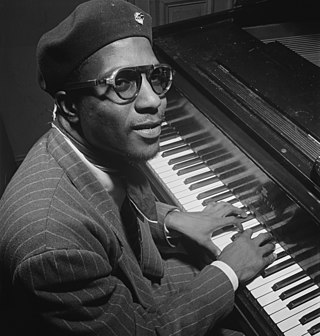
Thelonious Sphere Monk was an American jazz pianist and composer. He had a unique improvisational style and made numerous contributions to the standard jazz repertoire, including "'Round Midnight", "Blue Monk", "Straight, No Chaser", "Ruby, My Dear", "In Walked Bud", and "Well, You Needn't". Monk is the second-most-recorded jazz composer after Duke Ellington.

Randolph Denard Ornette Coleman was an American jazz saxophonist, violinist, trumpeter, and composer known as a principal founder of the free jazz genre, a term derived from his 1960 album Free Jazz: A Collective Improvisation. His pioneering performances often abandoned the chordal and harmony-based structure found in bebop, instead emphasizing a jarring and avant-garde approach to improvisation.
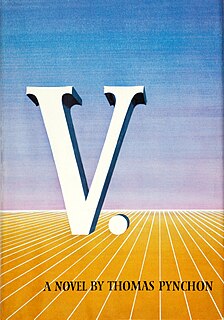
V. is the debut novel of Thomas Pynchon, published in 1963. It describes the exploits of a discharged U.S. Navy sailor named Benny Profane, his reconnection in New York with a group of pseudo-bohemian artists and hangers-on known as the Whole Sick Crew, and the quest of an aging traveler named Herbert Stencil to identify and locate the mysterious entity he knows only as "V." It was nominated for a National Book Award.
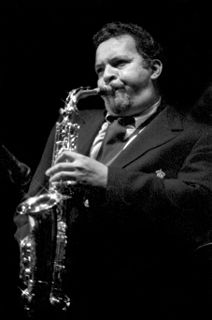
John Lenwood "Jackie" McLean was an American jazz alto saxophonist, composer, bandleader, and educator, and is one of the few musicians to be elected to the DownBeat Hall of Fame in the year of their death.

The Five Spot Café was a jazz club located at 5 Cooper Square (1956–1962) in the Bowery neighborhood of New York City, between the East and West Village. In 1962, it moved to 2 St. Marks Place until closing in 1967. Its friendly, non-commercial, and low-key atmosphere with affordable drinks and food and cutting edge bebop and progressive jazz attracted a host of avant-garde artists and writers. It was a venue of historic significance as well, a mecca for musicians, both local and out-of-state, who packed the small venue to listen to many of the most creative composers and performers of the era.

Charlie Rouse was an American hard bop tenor saxophonist and flautist. His career is marked by his collaboration with Thelonious Monk, which lasted for more than ten years.

The SFJAZZ Collective is an American jazz ensemble comprising nine performer/composers, launched in 2004 by SFJAZZ, a West Coast non-profit jazz institution and the presenter of the annual San Francisco Jazz Festival.

The Avant-Garde is an album credited to jazz musicians John Coltrane and Don Cherry that was released in 1966 by Atlantic Records. It features Coltrane playing several compositions by Ornette Coleman accompanied by the members of Coleman's quartet: Cherry, Charlie Haden, and Ed Blackwell. The album was assembled from two unissued recording sessions at Atlantic Studios in New York City in 1960.
McClintic is a surname. Notable people with the surname include:
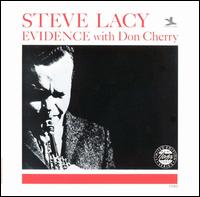
Evidence is the fourth album by Steve Lacy and was released on the New Jazz label in 1962. It features performances of four tunes written by Thelonious Monk and two from Duke Ellington by Lacy, Don Cherry, Carl Brown and Billy Higgins.

Archie Shepp & the New York Contemporary Five is a live album by the New York Contemporary Five recorded at the Jazzhus Montmartre in Copenhagen, Denmark, on November 15, 1963, and featuring saxophonists Archie Shepp and John Tchicai, trumpeter Don Cherry, bassist Don Moore and drummer J. C. Moses. The album was originally released on the Sonet label in 1964 as New York Contemporary 5 in two separate volumes on LP and later as an edited concert on a single CD, removing the track "Cisum."

A Fickle Sonance is an album by American saxophonist Jackie McLean recorded in 1961 and released on the Blue Note label. It features McLean in a quintet with trumpeter Tommy Turrentine, pianist Sonny Clark, bassist Butch Warren and drummer Billy Higgins.
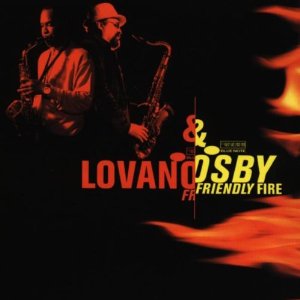
Friendly Fire is an album by the American jazz saxophonists Joe Lovano and Greg Osby recorded in 1998 and released on the Blue Note label.
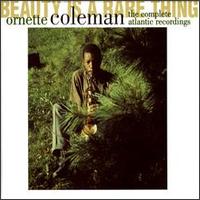
Beauty Is a Rare Thing is a compilation box set collecting all the master recordings made for Atlantic Records between 1959 and 1961 by the American jazz composer and saxophonist Ornette Coleman. The set was released on Rhino Records in 1993, and reissued in March 2015.

The Smithsonian Collection of Classic Jazz is a six-LP box set released in 1973 by the Smithsonian Institution. Compiled by jazz critic, scholar, and historian Martin Williams, the album included tracks from over a dozen record labels spanning several decades and genres of American jazz, from ragtime and big band to post-bop and free jazz.
The following is the discography of American jazz pianist and composer Thelonious Monk (1917–1982).

Finger Wigglers is an album by bassist Michael Bisio and multi-instrumentalist and composer Joe McPhee recorded in 1996 and first released on the CIMP label.
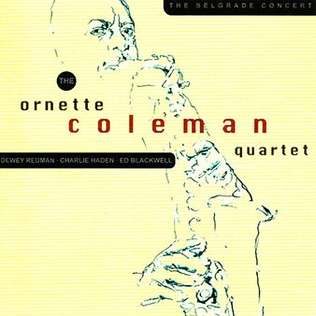
The Belgrade Concert is a live album by Ornette Coleman. It was recorded in November 1971 in Belgrade, and was released by Jazz Door in 1995. On the album, which was recorded one day after the concert documented on Live in Paris 1971, Coleman is joined by saxophonist Dewey Redman, bassist Charlie Haden, and drummer Ed Blackwell.
References
- ↑ Davis, Francis (September 1985). "Ornette's Permanent Revolution". The Atlantic . Retrieved May 11, 2020.
In Thomas Pynchon's novel V. there is a character named McClintic Sphere, who plays an alto saxophone of hand-carved ivory (Coleman's was made of white plastic) at a club called the V Note.
- ↑ Yaffe, David (April 26, 2007). "The Art of the Improviser". The Nation . Retrieved May 11, 2020.
Of all the ink spilled on Coleman's impact, perhaps the most memorable came from Thomas Pynchon's 1963 debut novel, V., in which the character McClintic Sphere (with a last name nodding to Thelonious Monk's middle name) sets the jazz world on end at a club called the V-Note.
- ↑ Bynum, Taylor Ho (June 12, 2015). "Seeing Ornette Coleman". The New Yorker . Retrieved May 11, 2020.
In Thomas Pynchon's 1963 novel 'V.', a thinly veiled character named McClintic Sphere appears, playing a 'white ivory' saxophone at the 'V Spot.' Pynchon's wonderfully terse parody of the portentous debate around Coleman's music is as follows: 'He plays all the notes Bird missed,' somebody whispered in front of Fu. Fu went silently through the motions of breaking a beer bottle on the edge of the table, jamming it into the speaker's back and twisting.